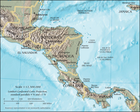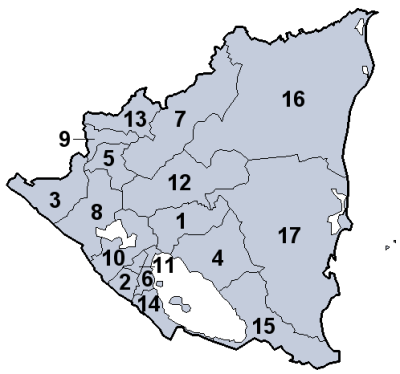Portal:Nicaragua
The Nicaragua Portal
Nicaragua, officially the Republic of Nicaragua, is the geographically largest country in Central America, comprising 130,370 km2 (50,340 sq mi). With a population of 6,850,540 as of 2021, it is the third-most populous country in Central America after Guatemala and Honduras. Nicaragua is bordered by Honduras to the north, the Caribbean Sea to the east, Costa Rica to the south, and the Pacific Ocean and a shared maritime border with El Salvador to the west. The country's largest city and national capital is Managua, the fourth-largest city in Central America with a population of 1,055,247 as of 2020. Nicaragua's multiethnic population includes people of mestizo, indigenous, European, and African heritage. The country's most spoken language is Spanish, though indigenous tribes on the Mosquito Coast speak their own languages and English. Originally inhabited by various indigenous cultures since ancient times, the region was conquered by the Spanish Empire in the 16th century. Nicaragua gained independence from Spain in 1821. The Mosquito Coast followed a different historical path, being colonized by the English in the 17th century and later coming under British rule. It became an autonomous territory of Nicaragua in 1860 and its northernmost part was transferred to Honduras in 1960. Since its independence, Nicaragua has undergone periods of political unrest, dictatorship, occupation and fiscal crisis, including the Nicaraguan Revolution of the 1960s and 1970s and the Contra War of the 1980s. (Full article...) Selected article -Palo de Mayo (English: Maypole; or ¡M ayo Ya!) is a type of Afro-Caribbean dance with sensual movements that forms part of the culture of several communities in the RAAS region in Nicaragua, as well as Belize, the Bay Islands of Honduras and Bocas del Toro in Panama. It is also the name given to the month-long May Day festival celebrated on the Caribbean coast. Both the festival and dance are an Afro-Nicaraguan tradition which originated in Bluefields, Nicaragua in the 17th century. (Full article...)Did you know...
Related portalsWikiProjectsSelected image -SubcategoriesNicaragua news
Things you can do
Nicaragua TopicsDepartmentsNicaragua is a unitary republic. For administrative purposes it is divided into 15 departments (departamentos) and two self-governing regions (autonomous regions). (Department capitals in parentheses) Associated WikimediaThe following Wikimedia Foundation sister projects provide more on this subject:
Sources
Discover Wikipedia using portals | ||||||||||









.jpg/440px-Nicaragua_2017-03-15_(33978834325).jpg)
_in_Nicaragua.jpg/440px-Sopa_de_mariscos_(seafood_soup)_in_Nicaragua.jpg)














